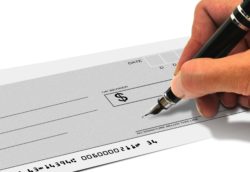Top Class Actions’s website and social media posts use affiliate links. If you make a purchase using such links, we may receive a commission, but it will not result in any additional charges to you. Please review our Affiliate Link Disclosure for more information.
Every year, financial institutions make billions of dollars in NSF and overdraft fees. Although banks and credit unions are allowed to charge NSF or overdraft fees when appropriate, some consumers claim that banks may be routinely overcharging their customers or even engaging in deceptive fee practices. Attorneys are investigating a number of banks for potentially overcharging customers, including Lake City Bank.
Were You Overcharged Fees on a Lake City Bank Checking Account?
Lake City Bank was founded in 1872 in northern Indiana. Over almost 150 years, the bank has expanded and now serves customers across the entire state through 50 branches. It is the third oldest financial institution based out of the state, and holds approximately $5.6 billion in assets.
Lake City Bank offers several types of banking for consumers, including personal banking, business banking, and wealth management. However, according to some consumers who hold savings and checking accounts at the bank, Lake City Bank may have a predatory fee structure for overdrafts on these accounts, and may overcharge customers.
What Are Bank Fees?
There are several types of bank fees that may be assessed against customers who hold a Lake City Bank checking account. Overdraft fees are a common bank fee that many people are familiar with. This fee is assessed when a customer overdraws their account, or attempts to spend money that they do not have. If they have overdraft protection, the transaction will still go through. In these cases, the bank is essentially giving a customer an immediate loan for the cost of the items, and will assess an additional fee against the customer’s account. This fee is often in the range of $25 to $40, according to NerdWallet.
If customers have not opted in to overdraft protection and attempt to make a purchase without having an adequate level of funds, the transaction will be declined and an NSF fee may be assessed. An NSF fee, or non-sufficient funds fee, may be similar in cost to an overdraft fee. The main difference is that in the case of an NSF fee, the transaction has been denied.
Although it is legal for banks to charge these fees, some banks engage in deceptive practices regarding how and when they assess them. Many banks reportedly reorder transactions before processing them, making it difficult for customers to determine when they are in danger of overdrawing their account. Rather than processing transactions in the order that they were made, some banks process them from largest to smallest in order to charge the most money in fees that they can.
In addition to potentially creating confusion for customers, this practice may also make it more likely for banks to collect multiple fees from a single NSF or overdraft transaction. These fees may quickly add up. Although many banks have limits on how many overdraft or NSF fees may be assessed against a customer in a single day, this cap is often as high as twelve fees.
How Much are Lake City Bank Fees?
Lake City Bank checking fees are slightly higher than the median overdraft fee of $35. According to the bank’s website, Lake City Bank assesses a $38 fee for each overdraft or non-sufficient funds transaction. Up to six overdraft fees may be assessed in a single day—meaning that Lake City Bank may charge one account up to $228 in overdraft fees during a single day.
Additionally, the bank also applies penalties to customers who do not return their accounts to a positive balance promptly. If the account is still in the negative after five days, the bank will begin to assess a $25 fee for each day it remains in the negative. If multiple overdrafts have occurred, this $25 fee will be applied for up to four of them—up to $100 in total.
Unfortunately, these fees may quickly add up. If a customer makes six transactions in a day which result in an overdraft, they may be charged $228 initially and an additional $100 in fees over four days if their account remains negative.
According to consumers who have been hit with overdraft fees from Lake City Bank or other financial institutions, banks may be purposefully reordering customer transactions in order to make a profit off of multiple fees. Consumers have claimed that it is predatory and unfair to assess multiple fees on a single overdraft transaction. Additionally, these fees may disproportionately affect people who are already financially vulnerable. Less than 20% of account holders pay more than 90% of all overdraft fees, and 80% of overdraft fee payers have less than $350 in their bank accounts.
According to a 2016 study from the Pew Charitable Trusts, more than 40% of the largest banks in the U.S. engage in the practice of rearranging the order that transactions are processed in. Although banks may claim that this re-ordering has nothing to do with making a profit, overdraft and NSF fees brought in almost $12 billion in profits for banks in 2017. Additionally, only banks with over $1 billion in assets were surveyed in order to determine that sum, meaning the true profits that banks have made from overdraft fees may be much higher.
In 2019 and 2020, this profit margin skyrocketed even higher, with at least one financial research company estimating that banks and other financial institutions brought in more than $34 billion from these fees from more people can’t afford them. Cries have arisen to ban these fees during the coronavirus pandemic. So far, such a ban has not been implemented, though Oone online bank, Ally Bank, eliminated overdraft fees voluntarily.
Additionally, another study from Pew conducted in 2014 indicated that more than half of Americans who had been charged an overdraft fee didn’t remember opting in to overdraft coverage. Many bank customers who have been assessed these fees may not even have been aware that they were at risk of being charged.
Many consumer advocates and lawmakers have proposed changes to banking regulations that would make it more difficult for financial institutions to assess overdraft fees, and require greater transparency regarding how and when these fees are addressed. However, until any policy changes are enacted, speaking with an experienced attorney about your case may be a way for you to pursue compensation and reimbursement for predatory fees charged to your Lake City Bank checking account.
Can You Pursue Reimbursement for Overdraft Fees?
If you have been assessed what you believe are predatory Lake City Bank checking account fees, you may be able to speak with an experienced attorney about the legal options available to you. Some victims of unfair fees may be able to join or file a class action lawsuit against their bank and pursue compensation and reimbursement for these fees.
Filing a lawsuit can be a daunting prospect, so Top Class Actions has laid the groundwork for you by connecting you with an experienced attorney. Consulting an attorney can help you determine if you have a claim, navigate the complexities of litigation, and maximize your potential compensation.
ATTORNEY ADVERTISING
Top Class Actions is a Proud Member of the American Bar Association
LEGAL INFORMATION IS NOT LEGAL ADVICE
Top Class Actions Legal Statement
©2008 – 2024 Top Class Actions® LLC
Various Trademarks held by their respective owners
This website is not intended for viewing or usage by European Union citizens.
















